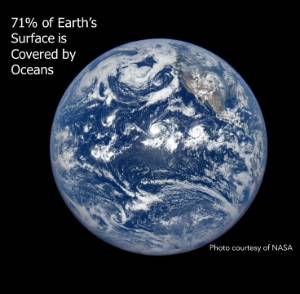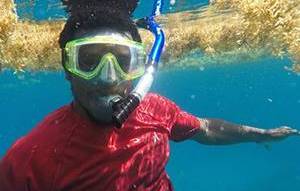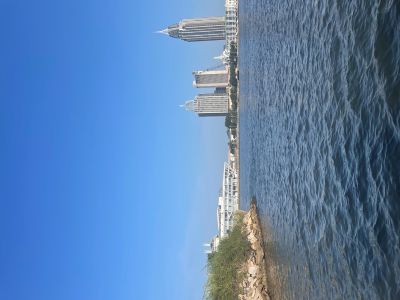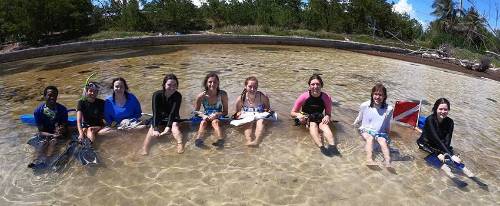Minor in Marine Science
Mysteries Waiting to Be Explored
Seventy percent of Earth's surface is covered by oceans. The oceans shape weather
patterns, regulate climate, and influence rainfall. Ocean dynamics affect temperatures
and moisture levels, impacting life far beyond the water's edge.

The Marine Sciences minor in the Stokes School of Marine and Environmental Sciences provides students with basic academic knowledge and field experience. This program helps students apply the skills they learn in their major field of study to real-world questions in marine science.
 Photo Courtesy of Sarah Gibbs
Photo Courtesy of Sarah Gibbs
Broaden Your Horizons

When the ocean becomes the classroom, students experience learning through real-world exploration.
A minor in marine sciences can provide you with a broader understanding of our oceans as well as increase your career and academic opportunities. This minor is open to any University of South Alabama majors, although students not majoring in other science disciplines may need additional preparation or prerequisite courses.
Introductory and core classes are offered at the University of South Alabama's main campus. However, faculty may also work at the Dauphin Island Sea Lab (DISL), located approximately 35 miles south of Mobile. Within a short distance of these two locations, there are diverse habitats including the:
- Mobile-Tensaw Delta
- Mobile Bay
- Mississippi Sound
- Barrier Islands and
- Open Gulf Habitats
Course Requirements
The Marine Science minor places an emphasis on a rigorous natural science foundation. Students planning the minor should check catalog course descriptions carefully and should meet with advising staff in the Marine and Environmental Sciences Program office.
Requirements for a Minor in Marine Sciences include
- ≥ 18 hours in Marine Sciences related classes.
- Three required courses (Ocean Sciences with Lab, Marine Sciences I, and Marine Sciences II)
- 8 credit hours of coursework
- at South or at the Dauphin Island Sea Lab during the Summer Program
- equivalent to 2-3 electives courses
Up to 6 hours required by a student’s major may be applied toward the minor.
| Course Code | Course Name | Credit Hours |
|---|---|---|
| MAS 134 & MAS 134 L | Ocean Science with Lab | 4 |
| MAS 331 | Marine Science I | 3 |
| MAS 332 | Marine Science II | 3 |
| Course Code | Course Name |
|---|---|
| MAS 367 | Marine Biology |
| MAS 371 | Shark and Ray Biology |
| MAS 430 | Marine Botany |
| MAS 451 | Marine Vertebrate Zoology |
| MAS 471 | Marine Invertebrate Zoology |
| MAS 475 | Marine Ecology |
| MAS 477 | Coral Reef Biology & Ecology |
| MAS 478 | Marine Mammal Health/Stranding Response |
| MAS 488 | Field Marine Science II |
| MAS 490 | Special Topics |
Other DISL offered courses will be considered for elective.
| Freshman/Sophomore Year | ||
|---|---|---|
| Course Code | Course Name | Credit Hours |
| MAS 134 & MAS 134L | Ocean Sciences with Lab | 4 |
| Junior/Senior Level | ||
| Course Code | Course Name | Credit Hours |
| MAS 331 | Marine Sciences I | 3 |
| MAS 332 | Marine Sciences II | 3 |
| Two to Three MAS listed electives at the Dauphin Island Sea Lab or at USA main campus | ||
If you are considering a minor in marine sciences, please check the course catalog descriptions carefully and arrange a meeting with Dr. Amy Sprinkle, sprinkle@southalabama.edu or another advisor in the Stokes School of Marine & Environmental Sciences.






